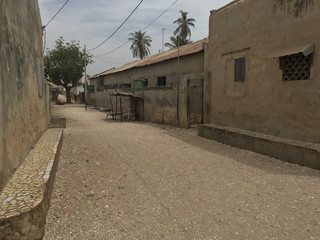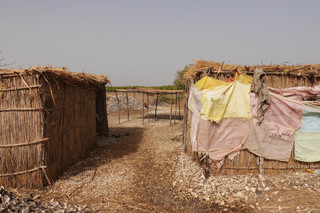We commonly understand the history of human civilisation as a linear process. Egalitarian bands of hunters and gatherers turned into sedentary farmers and what followed was the privatisation of property, accumulation, the emergence of cities, political systems and social stratification. The Serer Niominka, a little stratified society living on the islands of the hypersaline Sine-Saloum Delta, however, have, as many other communities around the world (e.g. the Nuer, the Inuit or the Cheyenne and Lakota), historically been stretching out and contracting in a future oriented circularity, experimenting with various social and economic realities – they lived in villages and dispersed on the sea or in temporary camps, depending on the seasons and the tides and they shifted between water- and land-related work practices, between fishing, mollusc gathering, trading or transporting and agriculture.
Today, old men narrate how they used to trade tobacco and sugar to the crews of fish trawlers for some of their by-catch far off in the Atlantic, how they drove down the coast by sail and helm following the fish and how they set up camps for weeks or months in the estuaries, before returning home towards the rainy season. Elderly women again tell stories about joining their husbands to the camps or about staying on an offshore spit for a week at a time when the tides allowed to gather molluscs during daytime.
Months- or week-long fishing campaigns and temporary camps in order to fish and search for molluscs have nearly vanished, but other routes and movements have evolved in the people's strive for connectivity and social and economic well-being. Consequently, there are many families who have some members frequenting the coast on foreign fish trawlers or living (temporarily) abroad or in the cities 'sur terre'. And also those who are based on the islands do not simply stay put. Both the main water-related work practices, fishing and mollusc gathering, are above all taking place in the dry season, where they are highly dependent on the movement of the sea. Pirogues cannot leave or access many ports at low tide, fish are most abundant around spring tide (i.e. full and new moon) and mollusc searching depends on the accessibility of sandbanks, mudflats and mangroves during daytime. During the rainy season again, fish and molluscs are for the most part left to recover while people turn towards the fields, (re)build pirogues or search for temporary jobs 'sur terre'. Life and matter, it is said, are caught up in continuous 'Soupit' (change).
The Sine-Saloum Delta was and is thus not an isolated entity but always in a multifarious relation with the world, mediated strongly by the circular movements of tides and seasons. Other, more recent environmental phenomena, however, are rather linear: Declining rainfall, coastal erosion and sea level rise are fostering salinisation, siltation and mangrove loss, which again, accompanied by population growth and overexploitation, impair the reproduction and growth of fauna and flora. These changes are countered with moratoriums and bans for fishing and mollusc gathering, protective dams, freshwater 'imports' or mangrove replantation that are sometimes able to mitigate, yet unable to reverse them. For example, as wells increasingly fell salty or dry, drinking water was started to be pumped via pipes from terra firma. In contrast, rice cultivation has been completely abandoned after the little valleys catching the rainwater got more and more inundated with tidal saltwater.
There are indeed further phenomena, flows and things that detract themselves from the circularity of the seasons and tides in place. Molluscs served as the basis of trade for millennia, allowing for the acquisition of goods manufactured elsewhere under their own conditions. Religious feasts following the islamic calendar, weddings or deaths halted the village life for days. Over time, sun dried stoneware jugs were replaced by imported iron or plastic ones while the wood for the pirogues was imported from foreign forests. Roads were built to the 'border' of the delta. They brought urban centres with both their demands and offers closer, and when they recently got tarred, they cleared the way for steady year-round movement. Mobile phone antennas were erected, which provide once more, once less stable new connections. Solar panels and generators running on fuel try to keep up with the growing power demand of TV's, fridges or smartphones, but blackouts and rationalisations remain the order of the day. Pirogues again now plow with 15 to 40 horsepowers through the estuaries and the Atlantic ocean. Motors have widened the radius' of the fishers and make them less dependent on tides and wind, while tying them to the global oil production and price rates. And hibiscus, millet, groundnut and maize are sowed and processed more and more with the help of machines, reducing manual labor. Hence, relations across scale tighten and linearity expands, while work and mobility again rely no more solely on moving soil and water as well as on muscular, tidal and wind energy but also increasingly on non renewable fossil fuels and matter that is meant to remain fixed.


